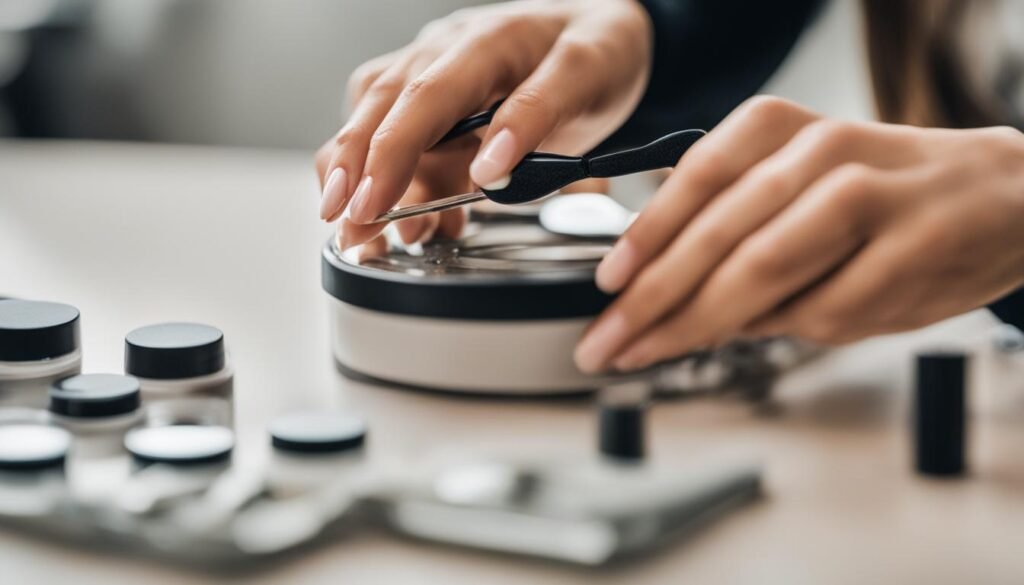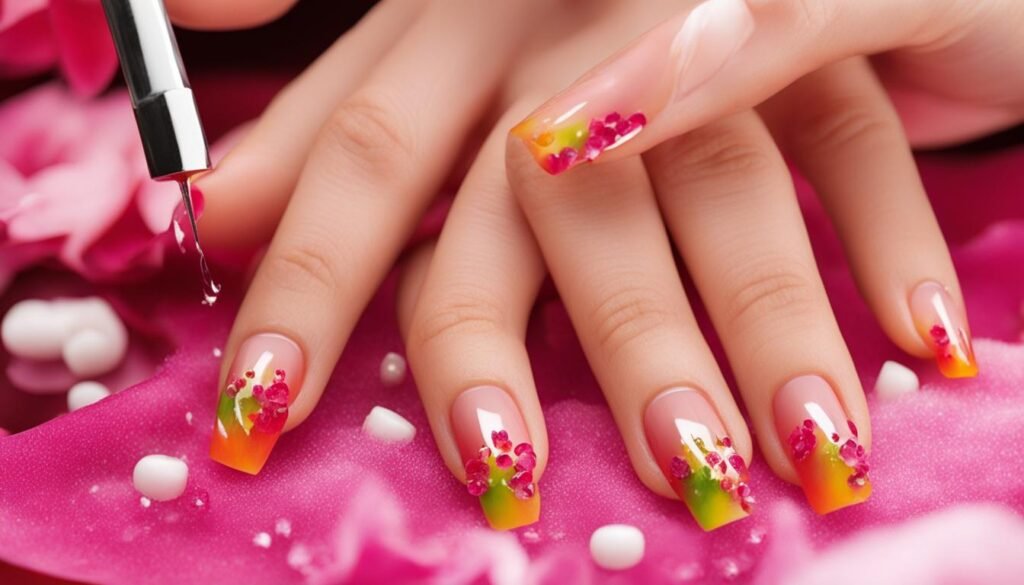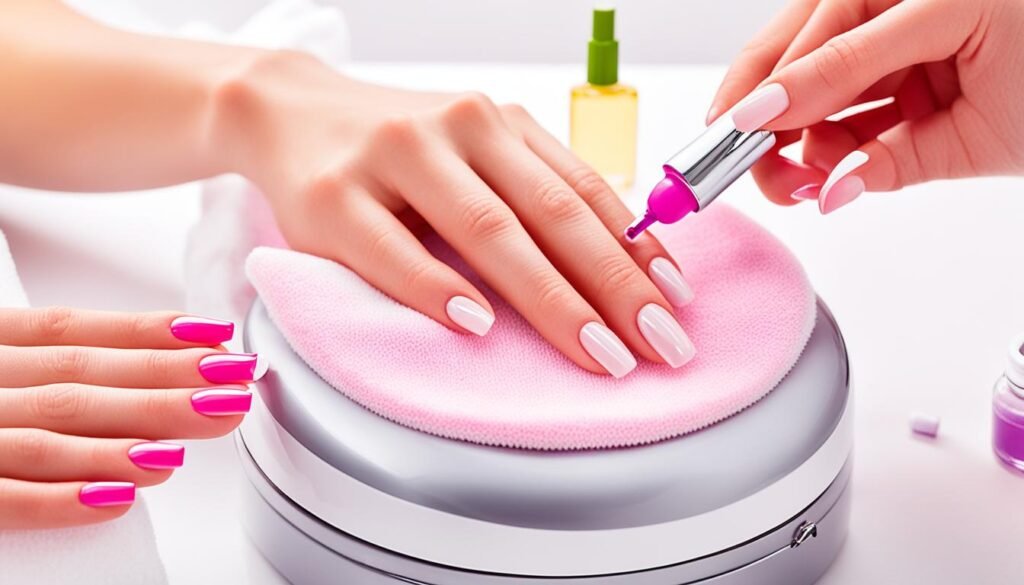Acrylic nails have taken the beauty world by storm, adorning the fingertips of influencers and celebrities everywhere. But do you know how to properly care for these stunning enhancements? Are you aware of the maintenance routine they require to keep them looking flawless and healthy?
Whether you’re a seasoned acrylic nail wearer or considering giving them a try for the first time, it’s essential to understand the proper care techniques for these trendy beauties. From aftercare to removal, our comprehensive guide will provide you with all the tips and tricks you need to keep your acrylic nails in top shape.
Key Takeaways:
- Regular fills are essential to maintain the appearance and strength of acrylic nails.
- Wearing gloves during activities that can potentially damage the nails is recommended.
- Moisturize and nourish your nails with cuticle oil for optimum health.
- Professional removal is crucial to avoid any damage to your natural nails.
- Investing in quality products can enhance the lifespan and appearance of your acrylic nails.
“What Are Acrylic Nails?”
Acrylic nails are a popular choice for those looking to enhance the strength, length, and thickness of their nails. They are created using a liquid monomer and a powder polymer, which are combined to form a paste that is then bonded to the natural nail. Unlike gel nails, acrylic nails do not require a UV light to set, making them a convenient option for many.
Acrylic nails are known for their durability, making them a great choice for those who want long-lasting manicures. They can withstand everyday activities and provide a larger canvas for intricate nail designs. Whether you want to achieve a classic French manicure or experiment with bold nail art, acrylic nails offer versatility and endless possibilities.
Benefits of Acrylic Nails:
- Increased nail strength
- Enhanced nail length
- Added nail thickness
With acrylic nails, you can enjoy beautiful, long nails without the worry of them breaking or chipping. They provide a sturdy foundation for your nail polish and designs, ensuring they last longer and stay intact. Whether you’re looking to rock the latest nail trends or simply want to enjoy strong and beautiful nails, acrylic nails are a fantastic option.
Acrylic nails offer durability, strength, and endless design possibilities. With their ability to enhance the natural nails, they have become a go-to choice for many nail enthusiasts.
“Are Acrylic Nails Safe?”
Acrylic nails have gained popularity for their ability to create stronger and longer nails. While acrylic nails are generally safe, it is important to take proper care to avoid any potential side effects. The removal process is a critical aspect of maintaining the health of the natural nails. Incorrect removal techniques can weaken the natural nails and cause damage. Therefore, it is highly recommended to have acrylic nails removed by a professional to ensure safe and healthy nail rejuvenation.
One of the best ways to promote natural nail health and rejuvenation is by occasionally taking breaks from acrylic nails. This allows the natural nails to breathe and recover from the constant exposure to chemicals and potential trauma during the application and removal processes. By giving your natural nails a break, you allow them to regain their strength and vitality.
Proper removal of acrylic nails is key to maintaining the health of your natural nails. It is advised to seek professional help for the removal process, as they have the expertise and proper tools to safely remove acrylic nails without causing any harm. Attempting to remove acrylic nails at home can lead to the nails becoming brittle, weak, or even damaged.
Improper removal can weaken the natural nails, but when done correctly, it won’t cause any permanent damage.
A professional nail technician will typically use an electric file to gently remove the top layer of the acrylics. Afterward, the nails will be soaked in an acetone solution to help dissolve the remaining acrylic. A cuticle pusher is then used to remove any excess acrylic, and the nails are thoroughly moisturized and revitalized with cuticle oil.

| Side Effect | Description |
|---|---|
| Allergic Reactions | Some individuals may experience allergic reactions to the chemicals used in acrylic nails, leading to redness, swelling, or itching. |
| Nail Damage | Improper application or removal can result in nail damage, including nail thinning, brittleness, or nail plate separation. |
| Infections | If proper hygiene practices are not followed, the risk of infections, such as bacterial or fungal, can increase. |
| Nail Fungus | Poorly maintained or improperly applied acrylic nails can create an ideal environment for nail fungus to develop. |
| Discoloration | Excessive exposure to nail polish or improper removal techniques can cause discoloration of the natural nails. |
By prioritizing safety and following professional guidance, you can enjoy the benefits of acrylic nails while maintaining the health and integrity of your natural nails. Remember to practice proper care, have acrylic nails professionally removed, and give your natural nails occasional breaks to rejuvenate. With the right care and attention, you can safely enjoy the beauty and longevity of acrylic nails without compromising your natural nail health.
“How Long Do Acrylic Nails Last?”
Acrylic nails offer a durable and long-lasting solution for those looking to enhance the appearance of their natural nails. The lifespan of acrylic nails can vary depending on several factors, including nail growth and maintenance. On average, acrylic nails can last for six to eight weeks before needing a fill.
During this time, it’s important to schedule regular fills every two to three weeks to prevent lifting and maintain the overall appearance of the nails. As the natural nails grow, there is a risk of the acrylics lifting, which can be prevented with timely fills.
| Factors Affecting Acrylic Nails Lifespan |
|---|
| Nail Growth |
| Regular Fill Schedule |
| Lifting of Acrylic Nails |
If left unfilled for an extended period, the gap between the acrylic nails and the natural nails increases, leading to an increased risk of lifting and potential damage to the natural nails. Regular fills help maintain the bonding and ensure the longevity of the acrylic nails.
By following a proper maintenance routine and scheduling regular fills, individuals can maximize the lifespan of their acrylic nails, keeping them looking fresh and beautiful.
Preventing Lifting of Acrylic Nails
One common issue faced with acrylic nails is lifting, where the artificial nails start to detach from the natural nails. To prevent this, consider the following steps:
- Ensure proper application of acrylic nails by a professional technician.
- Avoid excessive exposure to water and prolonged submersion in liquids.
- Refrain from picking or forcefully handling objects that may put pressure on the nails.
- Use gloves while doing activities that may cause damage to the nails, such as cleaning or gardening.
By taking these precautions and maintaining regular fill appointments, individuals can enjoy the beauty and longevity of their acrylic nails without worrying about lifting or damage to their natural nails.
“How Can You Make Acrylics Last Longer?”
While acrylic nails are known for their durability, proper care and maintenance are essential to maximize their longevity. By following a few simple tips and practices, you can keep your acrylic nails looking beautiful for an extended period of time.
First and foremost, it is important to protect your nails while engaging in activities that may cause damage. Wearing gloves when cleaning, gardening, or performing any tasks that expose your nails to excessive water or harsh chemicals can help prevent lifting or breakage of the acrylics.
In addition to protecting your nails, moisturizing your hands and cuticles regularly is key to maintaining their health. Applying a nourishing moisturizer and cuticle oil daily helps to keep the acrylics hydrated and prevents them from becoming dry and brittle.
Furthermore, conducting thorough research before choosing a salon or nail technician is crucial in ensuring the longevity of your acrylic nails. Look for reputable establishments that prioritize proper application techniques and provide the highest quality products. A skilled and experienced professional will ensure that your nails are properly cared for and maintained.
Lastly, regular fills are essential to prolong the lifespan of your acrylic nails. As your natural nails grow, the gap between the acrylics and the nail bed becomes visible. By scheduling regular fills every two to three weeks, you can maintain the seamless look of your nails and prevent any lifting or detachment.
Summary:
By wearing gloves during damaging activities, moisturizing with cuticle oil, conducting thorough salon research, and scheduling regular fills, you can significantly increase the longevity of your acrylic nails. Maintaining proper care and following these tips will ensure that your nails stay beautiful and intact for an extended period of time.
Now that you know how to make your acrylics last longer, let’s explore the best way to safely remove them in the next section.
“What’s the Best Way to Remove Acrylics?”
When it comes to removing acrylic nails, it’s important to leave it to the professionals for a safe and efficient removal process. Attempting to remove them yourself can lead to damage that may affect the health of your natural nails. To ensure a proper and gentle removal, follow these steps:
- Electric File: The first step in the professional removal process involves using an electric file to carefully remove the top layer of the acrylics. This helps to break the seal and make the removal process easier.
- Acetone Soak: After the top layer is filed down, your nails will be placed in an acetone soak for approximately 15 minutes. The acetone helps to break down the remaining acrylic, making it easier to remove without causing damage to the natural nails.
- Cuticle Pusher: Once the acrylic has softened in the acetone soak, a cuticle pusher is used to gently remove any excess acrylic from the surface of the nails. This step ensures that all traces of acrylic are removed and prepares the nails for the next step.
- Rehydration: Finally, after the acrylic has been fully removed, it is essential to rehydrate the nails. This is done by applying cuticle oil and gently massaging it into the nails and surrounding skin. Hydrating the nails helps to restore moisture and maintain their overall health.
By following these professional removal steps, you can safely and effectively remove your acrylic nails without causing any harm to your natural nails. Remember, always consult a professional for the best results.

“The Best Products for Acrylic Nails”
When it comes to maintaining the appearance and health of your acrylic nails, using the right products is essential. Here are some highly recommended products that can help moisturize, protect, and enhance the longevity of your acrylic nails:
| Product | Description |
|---|---|
| Vitamin E Cuticle Oil | A nourishing cuticle oil enriched with Vitamin E to hydrate and condition your cuticles, promoting healthier nail growth. |
| Gel Couture Top Coat | A high-quality top coat that adds a protective layer to your acrylic nails, preventing chipping, yellowing, and extending their lifespan. |
| Hand and Nail Treatment Cream | A rich and moisturizing cream specially formulated to nourish and hydrate both your hands and nails, keeping them soft and supple. |
| Killer Nails Supplement | A dietary supplement enriched with essential vitamins and minerals that support nail health, strength, and growth from the inside out. |
By incorporating these products into your acrylic nail care routine, you can ensure that your nails stay in optimal condition and continue to look fabulous. Remember to follow the instructions provided with each product for the best results.
“What Are Acrylic Nails?”
Acrylic nails offer a versatile and glamorous way to enhance the appearance of your natural nails. There are two main types of acrylic nails: false acrylic nail tips and powder acrylics. Let’s explore each type:
False Acrylic Nail Tips
False acrylic nail tips are pre-made plastic extensions that are applied to the natural nails. These tips are available in various shapes and sizes, allowing you to customize your nail length and shape according to your preference. They are adhered to the natural nails using nail glue and then trimmed and filed to achieve the desired look. False acrylic nail tips are a popular choice for their ease of application and versatility.
Powder Acrylics
Powder acrylics involve a chemical mixture of powder polymer and liquid monomer that is applied directly onto the natural nails. The liquid monomer initiates a reaction with the powder polymer, creating a thick paste-like substance that can be sculpted and shaped onto the nails. Once the mixture hardens, it forms a strong and durable acrylic overlay. This type of acrylic nails provides a sturdy and long-lasting solution, ideal for those who require extra nail strength and length.
Gel Nails vs. Acrylic Nails
While acrylic nails use a liquid and powder mixture, gel nails use a liquid resin that is cured under a UV or LED light. Gel nails offer a glossy and natural-looking finish, similar to acrylic nails. However, gel nails tend to be more flexible and are less likely to chip or break. Acrylic nails, on the other hand, are known for their durability and can withstand more wear and tear. The choice between acrylic and gel nails ultimately comes down to personal preference and the look you want to achieve.

Now that you have a better understanding of the types of acrylic nails available, you can choose the option that best suits your style and needs. Whether you opt for false acrylic nail tips or powder acrylics, these nails can transform your manicure into a work of art.
“Maintenance 101: Maximizing the Lifespan of Fake Nails”
Maintaining fake nails, such as handmade press-on nails, is crucial for ensuring they remain in excellent condition. The key to maximizing their lifespan lies in proper preparation and post-application care.
Before applying fake nails, it’s important to prepare the natural nails. Start by cleaning and shaping them to your desired length and shape. This will ensure a smooth surface for the adhesive to bond to. Using high-quality adhesive tabs or glue is essential for achieving a strong and long-lasting bond between the fake nails and your natural nails.
Once the fake nails are applied, it is important to take special care to prolong their lifespan. Avoid using your nails for tasks that can put unnecessary strain on them. Instead, use the pads of your fingers to open containers, type, or perform other everyday activities. This will help prevent any accidental damage or breakage of the fake nails.
Moisture control is also crucial for maintaining fake nails. Excessive exposure to water or prolonged contact with oils and lotions can weaken the adhesive and cause the nails to lift or come off. It’s important to dry your nails thoroughly after washing your hands and to avoid applying lotions or oils directly onto the base of the nails to protect the adhesive.
Proper storage is another essential aspect of fake nails maintenance. When you’re not wearing your press-on nails, store them in a cool, dry place. Avoid exposing them to excessive heat or direct sunlight, as this can cause the nails to warp or lose their shape. By following these tips, you can maximize the lifespan of your fake nails and keep them looking flawless.

